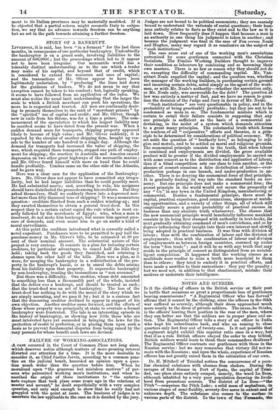STORY OF A BANKRUPT.
IrvanrooL, it is said, has been "in a ferment" for the last three months, in conselnenee of one particular bankruptcy. Undoubtedly the bankruptcy 313 on a grand scale, involving liabilities to the Amount of 800,0001.; but the proceedings which led to it appear not to have been irregular. Our mercantile world has a tolerably distinct understanding, as to the use which a trader may make of his capital, and beyond that of credit, which is considered to extend the resources and uses of capital; and the transactions of Mr. Oliver appear to have been legitimately undertaken, by "producing' the lines laid down for the guidance of traders. We do not mean to say that exception cannot be taken to his conduct; but, logically speaking, it seems to have followed from an application of the rules. We must also notice the usual tacit understanding that the larger the scale to which a British merchant can push his operations, the more he is respected and trusted. All men are continually desir- ing to promote themselves to the rank of "merchant princes" by the "spirited" use of capital and credit; and Mr. Oliver, though now in exile from his throne, was for a time a prince. The com- mencement of the speculation to which his largest liability may be ascribed seems to have dated from the present war. When a sudden demand arose for transports, shipping property appeared likely to become of high value ; and Mr. Oliver suddenly, it is reported by the circular of another shipping firm, bought up ves- sels to the number of one hundred in a single day. Although the demand for transports had increased the value of shipping, the war, which required those transports, stopped one path of employ- ment for shipping; the reaction in Australia and America caused depression on two other great highways of the mercantile marine ; and Mr. Oliver found himself with more on hand than he could .handle profitably. Crashes came on the other side of the Atlantic, and he gave way. Here was a clear case for the application of the Bankruptcy- laws. Mr. Oliver does not appear to have committed any irregu- larity, but he had larger liabilities than he could possibly meet. Be had substantial assets; and, according to rule, his assignees should have distributed the proceeds among his creditors. But they asked themselves, Shall we suddenly throw into a depressed_mar- ket more than fifty thousand tons of shipping? It was a momentous question: creditors flinched from such a sudden winding-up; and they exerted themselves to obtain a general trust-deed. In this respect they to a certain extent copied the rule which is most ex- actly followed by the merchants of Egypt; who' when a man is insolvent, do not make him bankrupt, but secure him against pres- sure of demands, and even assist him to go on under a kind of moral surveillance.
At this point the creditors introduced what is correctly called a novel expedient. Purchasers were to be permitted to pay half the purchase-money in Mr. Oliver's bills, to be estimated at 50 per cent of their nominal amount. The substantial nature of this project is very curious. It consists in a plan for inducing certain creditors, by particular advantages, to cancel half the bills they .held; taking back the goods they furnished, and retaining a chance upon the other half of the bills. Here was a plan, as it were, for merging the bankruptcy in a redistribution of the pro- perty in the bankrupt's hands, so as to annul the debts arising -from his liability upon that property. It supersedes bankruptcy by non-bankruptcy, treating the transactions as "non avenues."
But there was a difficulty. One creditor, whose debt amounted to something less than a thousandth part of the whole, insisted that the debtor was a bankrupt, and should be treated as such ; that the trust-deed was an act of bankruptcy. The loss of the trust-deed has nothing to do with the moral of the story which we -are simply narrating, and we pass it by; but it is a carious fact that the demurring creditor declined to appear in support of his -own objection. Another creditor -came forward, and the efforts of ;those whose property was principally at stake to overrule a formal :bankruptcy were frustrated. The tale is an interesting episode in -the history of bankruptcy, as showing how little those who are most interested have yet succeeded in bringing the laws for the protection of credit to perfection, or in placing them upon such a basis as to prevent fundamental disputes from being raised by the 'very persons for whose benefit such laws are devised.






































 Previous page
Previous page